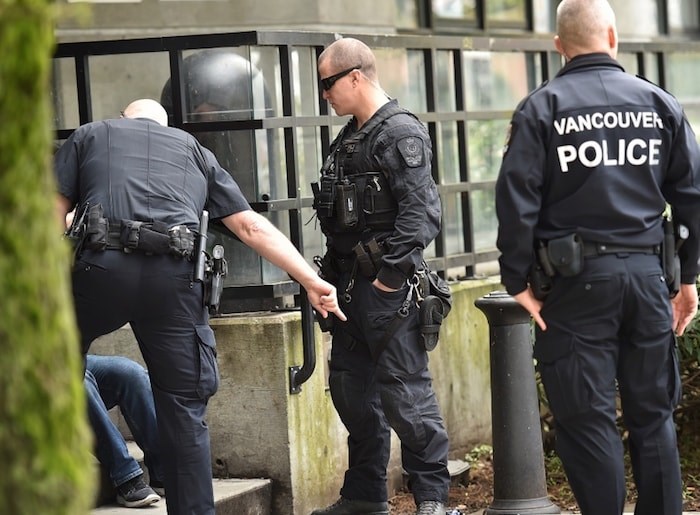A Vancouver Police Department review of how its officers conduct street checks has concluded what its chief has said publicly over the past few months—that the practice is not discriminatory, despite data showing an overrepresentation of Indigenous and black people being stopped by officers.
Even so, the department has recommended the Vancouver Police Board adopt six recommendations to ensure the public has “complete confidence” that the practice is not discriminatory towards a particular group of people.
 The Vancouver Police Department has completed a 62-page review of how officers conduct “street checks” and concluded the practice is not discriminatory. Photo Dan Toulgoet
The Vancouver Police Department has completed a 62-page review of how officers conduct “street checks” and concluded the practice is not discriminatory. Photo Dan Toulgoet
The recommendations include additional training for officers, releasing street check data annually, assigning an officer to improve communication with the Indigenous community and formalizing the department’s street check standards into policy so that it adheres with new provincial standards under development.
“While not being motivated by ethnicity or gender, the VPD appreciates that persons being checked can sometimes perceive that these factors may be at play, especially in instances where the person has limited previous interactions with the police,” said a report accompanying the 62-page review, which goes before the police board Wednesday.
The review was done in response to complaints lodged in June by the B.C. Civil Liberties Association and the Union of B.C. Indian Chiefs. The organizations said in a letter to the Office of the Police Complaint Commissioner the data police posted on its website in June created “a strong suggestion” that street checks were being conducted in a discriminatory matter.
The data, which was requested by a Vancouver Island blogger under the Freedom of Information and Protection of Privacy Act, showed police conducted 97,281 street checks between 2008 and 2017.
Of those checks, 15 per cent (14,536) were of Indigenous people and more than four per cent (4,365) of black people. Indigenous people make up just over two per cent of the population in Vancouver, and black people less than one per cent.
The VPD report posted on the police board’s website Monday said it was “unrealistic and overly simplistic to expect racial and gender population statistics to align uniformly with crime data.”
For example, the report continued, women make up about half of the population and men make up the other half. However, men commit approximately 80 per cent of crime, the report said.
In addition, the overrepresentation of specific groups within street check data is “not unique to visible minority communities,” said the report, noting that white people made up 46 per cent of Vancouver’s population in 2016, but accounted for 57 per cent of street checks.
According to the VPD’s 2017 guidelines, the definition of a street check is when an officer stops a person to conduct an interview or investigation in regards to suspicious activity or a suspected crime. The interactions take place in public, private or any place police have contact with the public.
The VPD review found that 80 per cent of street checks conducted in 2017 involved people already associated to crime by Metro Vancouver police agencies “and who, on average, had been the subject of 22 previous criminal investigations” prior to VPD officers stopping the person.
The review noted the percentage of street checks by ethnicity was comparable to the percentages of criminal charges. For example, 4.7 per cent of violent crime offenders captured in the data were black—“a result which supports the conclusion that the rate of street checks is highly correlated to the rate at which offenders are charged,” the review said.
“This outcome is not an indictment of any community or group, rather it indicates that overrepresentation of specific communities or groups is likely primarily driven by complex socio-economic factors,” the review said.
One of the recommendations from the department is that a new street check category be added to the police records system that specifically documents when an officer has dealt with a person to ensure their safety and well being.
The police data collected between 2008 and 2017 showed a total of 3,988 street checks of Indigenous females. The department pointed out 53 per cent of the checks were of females who were the subject of a missing person report.
In July, Josh Paterson, executive director of the B.C. Civil Liberties Association, told the Courier he was concerned the police board would not look beyond the police department’s review. He suggested an independent organization be sought to consult with Indigenous and black people most directly affected by the checks.
“The board should not be making a decision on an issue as complex as this with only a VPD report to guide them as to what to do,” Paterson said at the time. “It has the appearance of bias. With great respect to the chief [Adam Palmer], he—on day one of filing this complaint—was already out there in the media justifying their practices.”
In the review, Palmer acknowledged that Canada has “a troubling history” of systemic discrimination and that generational effects of colonization, displacement, the residential school system and “discriminatory government policies have disadvantaged and impoverished Indigenous people.”
“We recognize that this discrimination has led to substance use, poverty, homelessness and overrepresentation of Indigenous people in the criminal justice system,” the chief wrote. “As a society, we failed Indigenous people and, as chief, I feel strongly that we all have a responsibility to ensure that systemic racism and discriminatory practices do not happen, ever.”
The police board meeting begins at 1 p.m. Wednesday at the VPD’s Cambie Street precinct.



